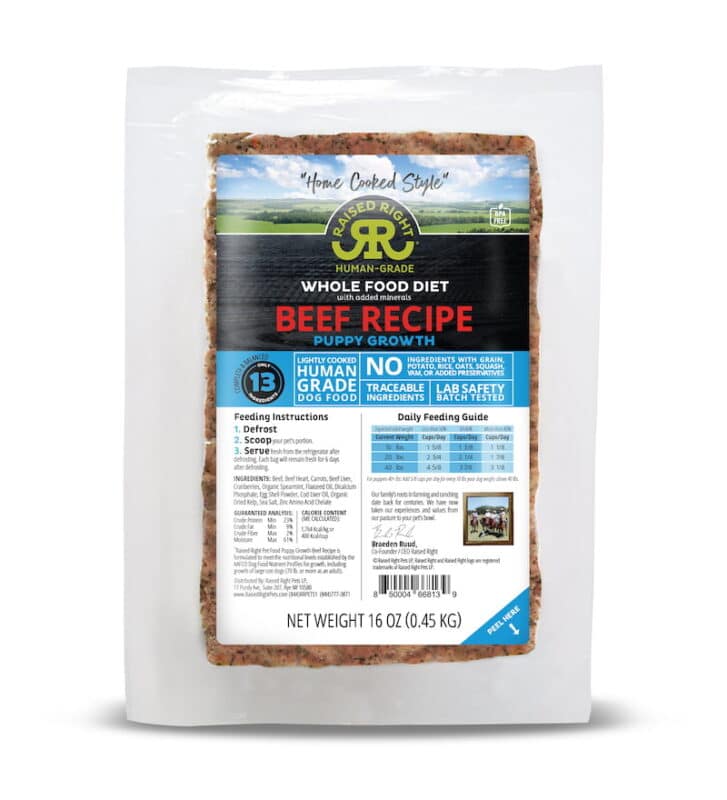No products in the cart.
Introduction
It’s no secret that many people are concerned about their pets’ diets. In fact, more and more people are turning to organic foods to supplement their animals’ regular diet. But what is organic food? And what is the difference between organic and inorganic dog food?
This article will explore these questions and compare organic food with regular food to help you make the best decision for your pet.
What is organic food?
Organic food differs from regular food in a few key ways.
First, organic foods are not made with pesticides, herbicides, or other synthetic chemicals. Secondly, they must be produced without the use of genetic engineering.
Thirdly, organic farming requires careful attention to soil health and nutrient management, as opposed to conventional agriculture, which typically relies on synthetic fertilizers and pesticides.
Finally, organic standards require that the animal feed used to produce organic food be certified.
What is inorganic food?
Inorganic food is made without any of the elements found in organic food. Chemicals, pesticides, and fertilizers are not used to produce inorganic food.
Organic food refers to food that has been grown using organic methods. These methods depend on natural processes such as composting, crop rotation, and watering with rain or dew. Organic food is not subject to the same chemical residues as non-organic food.
The difference between organic and inorganic dog food
Organic dog food is made without any of the harmful chemicals that are in regular dog food. Inorganic dog food contains ingredients like meat and bones, which can contain toxins.
The biggest difference between organic and inorganic dog food is the chemical residue that can be left on your pet’s fur after eating it. Chemical residues can be harmful to your pet if ingested, so keeping your pet fed organic food will help avoid potential health risks.
Additionally, organic grains are often milled differently than conventionally grown grains, which gives them a different composition that may provide additional benefits for your pup.
When choosing the right food for your canine companion, it’s important to consider their specific needs and preferences. If you have questions about what type of food is best for your dog, be sure to ask your vet or a trusted pet-related resource.
The benefits of organic food for your dog
Organic food is often considered more expensive, but that’s not always the case. In fact, there are many benefits to buying organic for your dog, both short- and long-term.
Short-term benefits of organic food for dogs include:
1-Organic food is typically higher in antioxidants, which can help protect your dog from disease, often has more flavour than conventionally grown food, which can make your dog happier and more active.
2-Organic food typically has fewer pesticides, leading to healthier soil and happier bugs.
Long-term benefits of feeding your organic dog food include:
1-Your dog’s gastrointestinal system will function better on organic food. This means less diarrhea and other digestive problems down the road.
2-Your dog will consume fewer harmful toxins when eating organic food. This includes things like heavy metals and chemicals found in conventional foods.\r
3-Your dog’s coat will be healthier if you feed him organic food because it contains more nutrient-dense ingredients like Omega 3s and 6s.
So, while organic food may initially cost more, many long-term benefits make it a worthwhile investment.
The benefits of inorganic food for your dog
There is a lot of debate between people about the best food type for their dog. Some people believe that organic food is better for them, while others believe that inorganic food is just as good. But what are the real benefits of each type of food?
Here are some of the biggest differences between organic and inorganic food for dogs:
1-Organic food typically contains more vitamins and minerals than inorganic food.
2-Organic foods are grown without pesticides, herbicides, or other chemicals, so they may be safer for your dog.
3-Inorganic foods are not as healthy as organic foods, but they are still better than regular kibble. Inorganic foods typically have more protein and fewer carbohydrates than kibble.
4-There is no one-size-fits-all answer to this question, as the best food for your dog will depend on their specific needsand diet preferences.
Conclusion
There is a lot of debate about whether or not organic food is better for your dog, but the bottom line is that it’s best to consult a vet before making any changes to your pet’s diet. Organic dog food does tend to cost a bit more than regular dog food, but it’s worth it in the long run because you’re ensuring that your pooch is eating foods that haven’t been sprayed with harmful pesticides or fertilizers. If you’re unsure whether your dog qualifies as “organic,” check out this guide on what makes a food organic.


